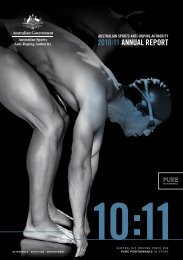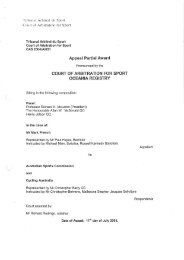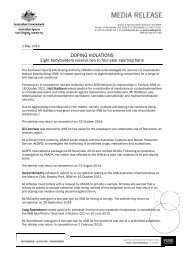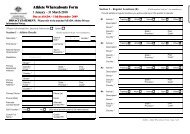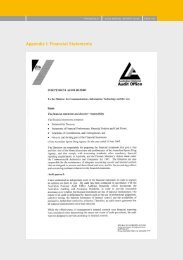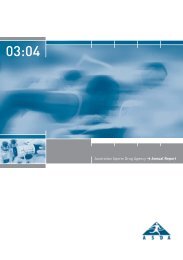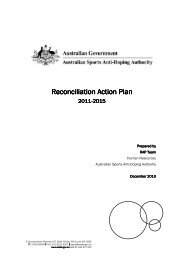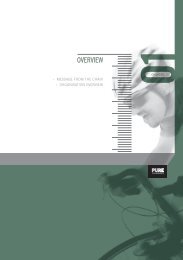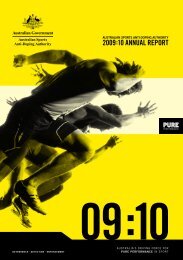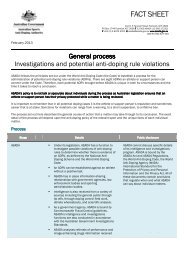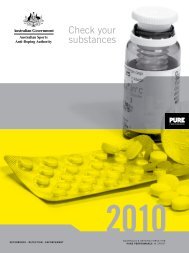PDF - 4.73MB - Australian Sports Anti-Doping Authority
PDF - 4.73MB - Australian Sports Anti-Doping Authority
PDF - 4.73MB - Australian Sports Anti-Doping Authority
Create successful ePaper yourself
Turn your PDF publications into a flip-book with our unique Google optimized e-Paper software.
From the outset of Operation Cobia, ASADA worked closely with the major sporting codes identified by theACC. This included ongoing high-level discussions about the investigation process, the requirements underindividual anti-doping policies and opportunities to strengthen the integrity of sports in relation to theiranti-doping frameworks.The investigation is both complex and wide-ranging. To date we have reviewed more than 50,000 documents andinterviewed over 150 athletes and support people. This is a massive achievement in such a short period of timewhen you consider comparable anti-doping investigations conducted here and overseas.ASADA’s investigation resources were doubled in the wake of the ACC report. This included the engagement ofhighly experienced investigators adept at conducting investigations of a sensitive and complex nature. Underthe 2013–14 Budget, the <strong>Australian</strong> Government committed an additional $1.8 million to ASADA so thoseresources are maintained until at least 2014–15.Prior to Operation Cobia ASADA had a robust investigation framework consistent with the requirements of theCommonwealth Fraud Control Guidelines and the <strong>Australian</strong> Government Investigations Standards (2011). Sincethe commencement of the investigation ASADA has further strengthened its investigative model by introducing thelatest processes and techniques used by leading law enforcement bodies and regulatory government agencies.Such developments have led ASADA to place a much greater emphasis on partnership strategies with thesegroups. As ASADA moves forward we will look for new opportunities to work with these groups on activities likejoint taskforces and interagency cooperative exercises.As at 30 June 2013, ASADA’s investigation of potential doping in sport arising from the ACC report is ongoing.Athlete whereaboutsUnder the Code and the National <strong>Anti</strong>-<strong>Doping</strong> scheme, <strong>Australian</strong> athletes in ASADA’s Registered Testing Pool(RTP) are required to provide location details (via a Whereabouts Filing) for the purposes of no-advance-noticeout-of-competition testing. <strong>Australian</strong> RTP athletes submit a Whereabouts Filing each quarter in accordance withASADA’s Athlete Whereabouts policy. All <strong>Australian</strong> RTP athletes now file their whereabouts using the AthleteWhereabouts Online System (AWOS).In accordance with the Code we liaise with a number of International Federations to streamline the submission andsharing of RTP athletes’ whereabouts filings. To date we have agreed to share whereabouts filings information withthe International Federations responsible for cycling, rowing, triathlon (including both International Triathlon Unionand World Triathlon Corporation), canoeing, athletics, swimming and the Swiss National <strong>Anti</strong>-<strong>Doping</strong> Organisation.Complying with whereabouts is crucial. Three filing failures within an eighteen-month period may constitutean anti-doping rule violation under the Code. Significant efforts are made to assist RTP athletes meet theirwhereabouts obligations. This includes:> offering 24/7 online access to AWOS> letting athletes or their representatives update whereabouts over the phone> providing quarterly information packs> issuing reminder letters, calls, emails and/or SMS texts> offering experienced whereabouts staff to provide assistance to new and existing RTP athletes> liaising with the relevant NSOs to provide them with updates on the compliance levels of RTP athletes in their sport.50




